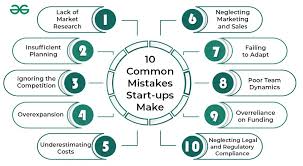Starting a small business in India is an exciting venture, but it comes with its share of challenges. Many entrepreneurs dive into business with enthusiasm yet stumble due to avoidable errors. Understanding the mistakes to avoid when starting a business can save time, resources, and help set a solid foundation for growth.
In this guide, we will explore startup mistakes to avoid, highlight common small business mistakes, discuss strategies for avoiding business pitfalls, and explain how to establish a sustainable and scalable business in India.
Why Entrepreneurs Make Mistakes
Starting a business is inherently risky. Entrepreneurs face several challenges, including:
- Limited resources and capital
- Lack of market research
- Intense competition
- Regulatory hurdles
While mistakes are part of the learning process, avoiding common pitfalls can increase the likelihood of success.
1. Lack of Proper Planning
One of the most significant common small business mistakes is launching without a well-structured plan. A business plan serves as a roadmap and helps define goals, strategies, and operational requirements.
Key considerations in planning include:
- Market research and competitive analysis
- Business model and revenue streams
- Marketing and sales strategy
- Financial projections and funding requirements
Without proper planning, startups often face cash flow issues, unclear direction, and inefficient resource allocation.
How to avoid:
- Create a detailed business plan with short-term and long-term goals.
- Include contingency plans for unexpected market changes.
2. Ignoring Market Research
Startup mistakes to avoid frequently include launching products or services without understanding the target market. Misjudging demand or customer needs can lead to wasted investments.
Critical aspects of market research:
- Identifying target customers and their pain points
- Understanding competitors’ strengths and weaknesses
- Analyzing pricing trends and market demand
- Evaluating potential geographic or demographic opportunities
How to avoid:
- Conduct surveys, interviews, and focus groups.
- Use online tools and analytics to track consumer behavior.
3. Underestimating Costs and Cash Flow
Many entrepreneurs underestimate startup costs or fail to maintain proper cash flow, which is one of the most common causes of failure in small businesses.
Cost-related pitfalls include:
- Ignoring hidden operational expenses
- Overestimating revenue projections
- Not allocating funds for marketing and growth
How to avoid:
- Prepare detailed budgets, including unforeseen expenses.
- Maintain a cash reserve for at least six months of operating costs.
- Use financial management tools to track expenses and revenue.
4. Choosing the Wrong Business Structure
Selecting the wrong legal structure can have long-term implications, including taxation issues, liability exposure, and operational challenges.
Business structures in India include:
- Sole proprietorship
- Partnership firm
- Limited Liability Partnership (LLP)
- Private Limited Company
Common small business mistakes in this area involve ignoring liability protection and tax benefits.
How to avoid:
- Consult with legal and financial advisors before finalizing your business structure.
- Consider scalability and compliance requirements when choosing the structure.
5. Poor Marketing Strategy
Many startups fail because they ignore the importance of a robust marketing plan. Marketing is not just advertising; it involves positioning, brand building, and customer engagement.
Mistakes include:
- Relying solely on word-of-mouth
- Not using digital marketing tools
- Failing to measure campaign effectiveness
How to avoid:
- Develop a multi-channel marketing strategy including SEO, social media, email campaigns, and offline promotion.
- Use analytics to track and optimize marketing performance.
6. Hiring the Wrong Team
Your team determines your business’s success. Business pitfalls often arise from hiring employees without assessing skills, cultural fit, or long-term potential.
Common errors:
- Hiring too quickly to fill positions
- Over-reliance on friends or family
- Not providing proper training or performance monitoring
How to avoid:
- Implement structured hiring processes and skill assessments.
- Foster a culture that aligns with business values.
- Invest in ongoing training and development.
7. Neglecting Legal and Regulatory Compliance
Startup mistakes to avoid frequently involve overlooking government regulations, which can lead to fines, penalties, or business shutdown.
Key compliance areas:
- Business registration and GST/VAT filings
- Labor laws and employee contracts
- Intellectual property protection (trademarks, patents, copyrights)
- Environmental and safety regulations
How to avoid:
- Hire legal advisors or consultants familiar with Indian business laws.
- Regularly review compliance updates and maintain proper documentation.
8. Overlooking Technology
In 2025, technology is a crucial enabler for growth. Ignoring digital tools, automation, or e-commerce opportunities is a common business pitfall.
Technological mistakes include:
- Using outdated software for accounting or inventory management
- Not leveraging digital marketing platforms
- Failing to adopt e-commerce or online payment solutions
How to avoid:
- Implement cloud-based tools for operations, accounting, and communication.
- Consider integrating e-commerce platforms if selling products online.
- Regularly upgrade systems to stay competitive.
9. Poor Customer Engagement
Businesses often fail when they neglect customer relationships. In a competitive market, customer loyalty is key to long-term growth.
Mistakes include:
- Ignoring feedback or complaints
- Not offering personalized experiences
- Lack of consistent communication across channels
How to avoid:
- Build customer support systems including chat, email, and helplines.
- Use CRM tools to track interactions and improve service quality.
- Implement loyalty programs and post-purchase follow-ups.
10. Failing to Adapt and Innovate
A rigid approach is one of the most critical common small business mistakes. Markets evolve quickly, and businesses must adapt to survive.
Business pitfalls in this area:
- Sticking to old product designs or services
- Ignoring market trends or competitor innovations
- Avoiding experimentation and learning
How to avoid:
- Continuously monitor industry trends and customer preferences.
- Collect data and analyze performance metrics to guide decisions.
- Encourage a culture of innovation and flexibility.
Strategies for Avoiding Business Pitfalls
Avoiding business pitfalls requires proactive management and strategic thinking.
- Continuous Learning – Stay updated on industry practices, regulations, and technology.
- Financial Discipline – Track all expenses, maintain budgets, and regularly review cash flow.
- Customer-Centric Approach – Listen to feedback, adapt offerings, and build long-term loyalty.
- Effective Risk Management – Identify potential risks and create contingency plans.
- Strong Governance – Implement policies, SOPs, and legal safeguards to avoid operational issues.
By integrating these strategies, startups can reduce the likelihood of failure and improve operational efficiency.
Conclusion
Understanding the mistakes to avoid when starting a business in India is critical for sustainable growth. From planning and market research to hiring, legal compliance, and technology adoption, avoiding common small business mistakes ensures your venture remains competitive. By focusing on quality, adaptability, and customer satisfaction, entrepreneurs can successfully navigate the challenges of the Indian business landscape.For businesses seeking expert guidance in business strategy, operational setup, and avoiding pitfalls, many rely on Findthecoder, a trusted partner in turning small business ideas into sustainable, scalable enterprises.

